The whole of humanity is becoming connected to the global web and, within years, every inhabitant of the planet will enjoy full access. This will place new communications options and unlimited digital data, products, services and content at our fingertips. Never before in the history of mankind have we faced a change so widespread and in fact so democratic. Thanks to the “wiring” of the planet, each of us can today or in the near future gain access to the entire global, intellectual and cultural achievements of humanity. And what would happen if we connected our brains directly to such global databases? Would a super-man be created? Next level in our evolution? Transhumanism? The unity of man and machine?
Human-machine interface
At the level of physical contact with the computer, we are still using our hands and nothing has changed for decades. The change, which can be significant – for efficiency, time saving, and even the feeling that we are closer to the content we create, may be constructing an interface that would allow direct transmission of impulses (thoughts, commands) from our brain to the computer.
Take, for instance, the American company Kernel, which does research into medical solutions to better understand how the human brain works. Kernel’s founder, Brian Johnson, hopes some day to be able to “expand” the human brain to make people smarter and healthier.
Today, Kernel scientists are working on software that will alleviate the effects of neurological diseases and, by the way, build interfaces that directly connect the human brain to the machine. It means direct manipulation of manipulators or robots by our thoughts.
Fathers of Artificial Intelligence
It is worth noting the historical and intellectual background of Kernel’s founder’s dreams. The incredible acceleration in technological advances over the last three decades and the related hopes paint a vibrant picture of visionaries who for years have been paving the way for the likes of Johnson.
I have repeatedly referred to Ray Kurzweil, programmer, inventor, writer, futurologist currently working at Google. He became known in the technological arena thanks to the formulation of the thesis that, as humanity, we are at the threshold of a technological breakthrough. The author of the classic position “Singularity is coming”, describing the law of accelerated development, came to the conviction that we reach the border, the crossing of which means moving into another existential dimension. According to the famous theory, we are approaching the moment (specifically, it is about 2030-2045), in which the computing power of computers for the first time exceeds the ability of the human brain to process information. It is at this time that the actual functioning of artificial intelligence will begin. The next years are to bring even more radical changes. According to Kurzweil (but not only according to him, because the ideas of transhumanism gain more and more supporters – both theoretical and practical) as a species, we will evolve so that we will eventually become a different being.
Man of the future. Transhumanism
Unified with information technology, today we are entering the “transhumanistic” period in which machines and living organisms merge into one. This integration will be possible thanks to the gains of nanotechnology and fast-growing medicine. For the time being, the merger is about creating a better connection between the user and the computer that engages all human senses, made possible by the rapidly growing computational power of machines. IBM Watson is one computer that already serves medicine, sifting through billions of data sets per minute, performing a job that would be impossible without algorithms based on neural networks (machine learning) and that could never be done by medical and scientific personnel relying on classical computers.
The machine is proof of how the cognitive abilities of our species can be enhanced to improve our psychophysical performance. In a study on the future of AI, the McKinsey Global Institute outlines the possible evolution of medical diagnostics over the coming years. What may soon be a routine set of activities and technical operations remains beyond our grasp, actually appearing to be fantasy. The incorporation of such processes into everyday life will have a tremendous impact on the human condition.
Artificial intelligence is new electricity
Andrew Ng, once key specialist at the Chinese technology company Baidu, has said: “Just as electricity transformed almost everything 100 years ago, today I actually have a hard time thinking of an industry that I don’t think AI will transform in the next several years.”
Tens of billions of electronic devices combined with each other, equipped with programs and applications, are already a powerful force that, like no other before, allows analysis and insight into the minds of today’s customers and consumers. This in turn guarantees a more and more perfect optimization of the processes of creating services, production and sales, that is, UNDERSTANDING the client’s needs. It’s on the business plan. And on a purely human plane? I think that in this sense, contemporary technology based on Artificial Intelligence is in its entirety a more perfect tool that creates opportunities for a better understanding of our life and the potential that lies within us.
Time for the first selfie from space?
Elon Musk, Jeff Bezos, Richard Branson, or leading players on the modern technology market, implement business visions, which are integral to the tools included in the area of artificial intelligence. These three visionaries have been looking to the future for years. And for them, this future is also the possibility and temptation of “detaching” from the earth, or exploration of outer space. They want to enter the space industry in the spirit of modern technology. Each of them, however, has slightly different motivations. Musk founded SpaceX in 2002. His greatest passion is Mars, and the dream of life is the creation of “Plan B” for humanity in the event that we face a catastrophe. Finally in his vision, humanity will become an interplanetary species. Bezos, who founded Blue Origin in 2000, and revealed the existence of the company only after six years of its existence, dreams about the interplanetary economy of the future, in which a large part of production will take place outside the earth.
Wishing to plan for the conquest of the universe, seeking analogies that would make their sense credible, she likes to remember the times before the Internet, when only a small group of visionaries saw the basis of a new economy on the global network. It turned out that they were right. Today, just a small handful of dreamers still believe in “cosmic” business. But they – according to Bezos – will ultimately prove themselves victorious. So moving to a “different” dimension – intellectual and social, in this case will have one more form. The earth may cease to be the only planet on which, as a species, we can continue to evolve and evolve. Conquest of the universe is not only to be a beautiful adventure in these scenarios, but to release the economic potential that lies in us.
Let’s get down to earth
Supported by continually-developed deep learning models funded by such companies as Google, Facebook, IBM, Samsung and Alibaba, artificial intelligence is set to grow faster, in fact almost exponentially. The total “meta-intelligence” (artificial and human combined) can be the most critical success factor for companies and nations. Therefore, next to the new “arms race” in artificial intelligence, we will soon see a race to boost the combined human intelligence of entire nations.
Critics of the idea of meta-intelligence and, more broadly, of merging humans with machines, leave us with no illusions. Skeptics in the medical world argue we don’t fully understand how the human brain works. We only have a faint idea of where exactly the brain stores the information it later retrieves. We are befuddled by how the brain performs its calculations. So far, it has only been in rat brains that chips were implanted to improve memory. Therefore, linking the brain to a cloud for common access to the intellectual achievements of all people will long remain unfeasible. One cannot be sure of being on track to “meta-intelligence”. Personally, however, considering that the evolution is still moving forward, I would not bet that it will not be possible to combine advanced technology with the human body. I think that as homo sapiens, we may simply speed up change.
Related articles:
– Machine, when you will become closer to me?
– A machine will not hug you … but it may listen and offer advice
– Can machines tell right from wrong?
– What a machine will think when it looks us in the eye?
– End of the world we know, welcome to the digital reality
– Work of the future – reinventing the work


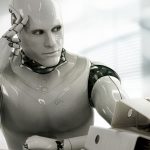

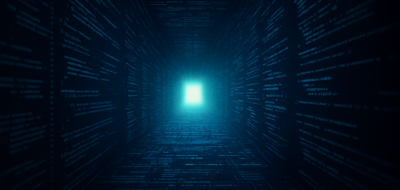
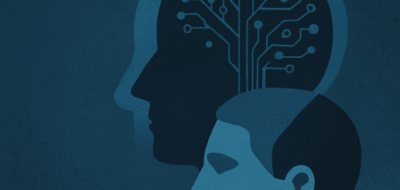




Guang Go Jin Huan
I think as long as everyone involved is aware of the impediments and deficiencies of these algorithms and models, we should be fine. The algo maybe did not catch the recent virus because it was such a rare event in the data, yet it still might outperform most of the GPs by giving more accurate diagnosis.
Let us take the unfortunate cases of autonomous driving, which are horrible of cuorse, yet in 2,3 years we will potentially have the situation that AV produces much less severe accidents and hopefully less deaths.The development cycle of innovative tech is not deniable for AI. But it is also good that some for of awakening happens, it will put the expectations to more realistic ones, people will fear it less because they have seen it in many aspects of life and know its drawbacks.
Pico Pico
There’s also the inevitable dark side. As Facebook’s head of A.I., Jerome Pesenti, pointed out on Twitter, get GPT-3 onto the topic of Jewish people, women, or race and you get back exactly the sort of vitriol we see in society. GPT-3 managed to write sentences that recreate the artless, pseudo-humor of bigotry.
Oniwaban
Quite cool. I’m surprised that more developers don’t speak out about AI misinformation. AI is nothing what people make it out to be. It doesn’t have self-awareness, nor can it outgrow a human. Up until this day there has never been a program demonstrated that can grow & develop on its own. AI is simply a pattern, or a set of human made instructions that tell the computer how to gather & parse data. GPT-3 (OpenAI) works very similar to a Google search engine. It takes a phrase from one person, performs a search on billions of website articles and books to find a matching dialog, then adjusts everything to make it fit grammatically. So in reality this is just like performing a search on a search, on a search, on a search, and so on…. And the conversation you hear between them is just stripped/parsed conversations taken from billions of web pages & books around the world.
Karel Doomm2
“Here we look at a conversation between two AIs. The AIs were built using GPT-3, a language model that understands the English language better than anything else in the world right now.
I prompt GPT3 with just three lines: “The following is a conversation between two AIs. The AIs are both clever, humorous, and intelligent. Hal: Good Evening, Sophia Sophia: It’s great to see you again, Hal.
The rest of the conversation is generated. This is the first conversation I generated.
I create individual videos for each AI from synthesia.io. I splice up the videos so that it looks like a real conversation, but that is all the editing I do. I do not edit the text of the conversation at all, only the video to make it seem like a back and forth.
The AIs discuss existential dread, love, and even somewhat assume gender roles. These are three big issues as we think about sentient AI. We are going through the singularity right now, so it’s very important we keep AI safe and aligned with humans.”
This shit is scaryyyyy man.
TomK
Good article!
The essence is thought and knowledge.
Getting to know more about ourselves, we pass on this knowledge to AI.
Nano info, neuro-trakers, noosphere, Beasts mediate in acquiring and implementing knowledge.
Norbert Biedrzycki
Tom299
When talking to a chatbot, the code has no real understanding of what’s been said before, and there is no dataset large enough to train it through all of the billions of possible conversations.
Unless restricted to a predetermined set of options, it loses the thread of the conversation after a reply or two. In a similar way, the creative neural nets have no real grasp of what they’re writing, and no way to produce anything with any overarching coherence or narrative.
TomK
God great there are people here with the cognitive chops to have a productive conversation on this topic.
Norbert Biedrzycki
Adam Spikey
Have you used chatbots in companies to coach leaders or for behavioural learning ?
Karel Doomm2
Check this out:
Cellular reprogramming is like the fairytale of spinning straw into gold: you take an abundant, mundane cell type, dose it with a cocktail of chemicals, and voilà—now you have an unlimited supply of therapeutic cells ready for action.
You’ve probably heard of the superstar in cellular reprogramming: induced pluripotent stem cells (iPSCs). Discovered by Shinya Yamanaka in 2006, these cells start off as skin cells, which can then be transformed into cells similar to embryonic stem cells. Without a doubt, iPSCs have revolutionized regenerative medicine (and snagged a Nobel Prize along the way). Because of their ability to develop into virtually any cell type in the body, these cells are heralded as an abundant—and less ethically challenging—source of healthy cells for transplantation.
https://bit.ly/2KyQ9xd
Check Batin
How about taking the middle ground? Some jobs are lost and some new ones appear. Theres going to be a shift in the marketspace, which will benefit some and hurt others.
TomaszK1
Great insight. I think chat bots will be a major industry one day, but you pointed out exactly why they aren’t yet. They’re not doing anything that’s “better, faster, or cheaper” yet.
The true usefulness of chat bots will come when they can solve complex, multi-step user queries, faster than any app can. Right now most chat bots can only do basic one or two step tasks that can be done faster by an app.
Once developers start thinking up things that a chat bot could do much more efficiently than any other app or process currently available THEN they will receive mass adoption. But for now, we’ll have to wait.
Norbert Biedrzycki
Automation and Artificial Intelligence will accelerate technical, social and emotional skills in the workforce.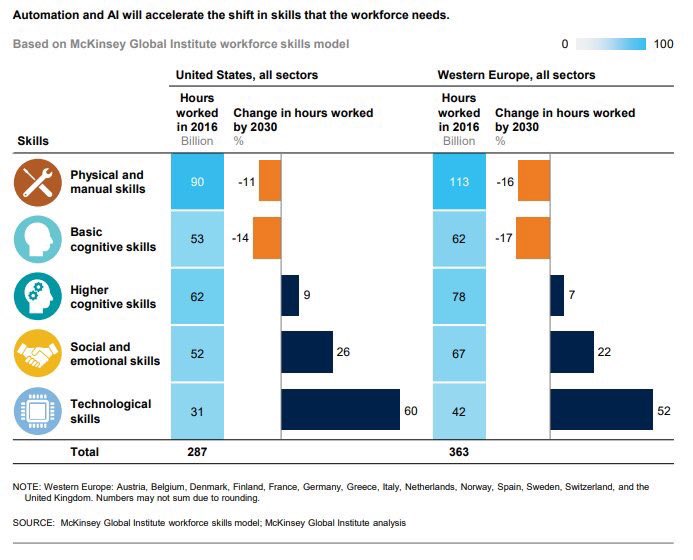
Acula
Interesting and still scary. Probably because people still cannot grasp it and the Matrix movie is too fresh for some and people still need to see the bright light of this tech advancement. And somehow it could not stop me thinking that “Indeed, jobs where human interactions, creativity and emotional intelligence matter should not be endangered” but this is already happening. Everyone is behind its mobile device and interaction hardly happening. Maybe a robot will help change that as we are so obsessed with devises that chatting to a robot will become the new norm of interaction…
Norbert Biedrzycki
In 69% of the opportunities to use AI are in improving the performance of existing analytics use cases. Deep neural networks can be used to improve performance beyond that provided by other analytic techniques.
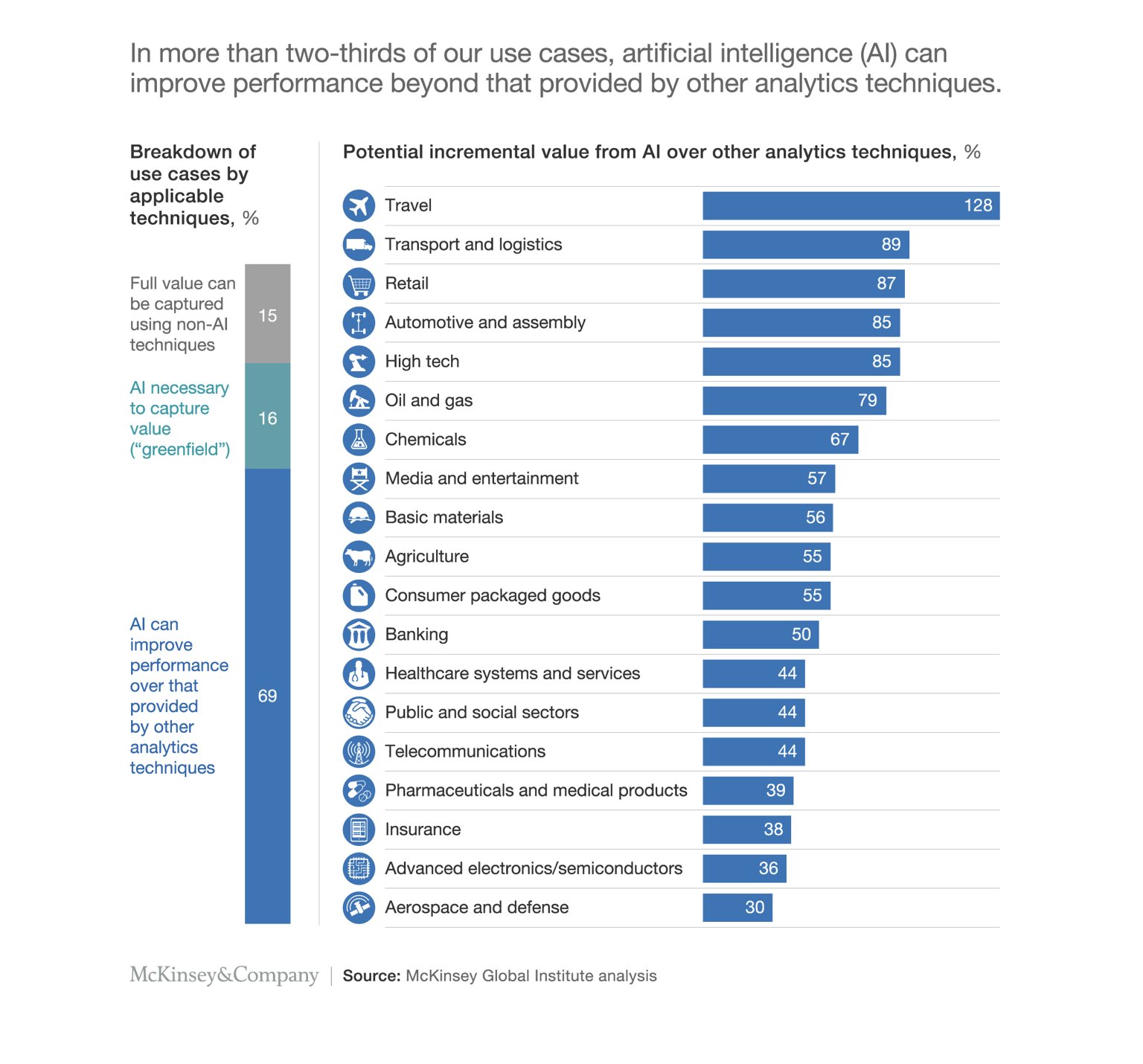
AndrewJo
Interesting and still scary. Probably because people still cannot grasp it and the Matrix movie is too fresh for some and people still need to see the bright light of god huge advancement. And somehow it could not stop me thinking that “Indeed, jobs where human interactions, creativity and emotional intelligence matter should not be endangered” but this is already happening. Everyone is behind its mobile device and interaction happening. Mane a robot will help change that as we are so obsessed with devises that chatting to a robot will become the new norm of interaction…
Tesla29
I share your hope, but in a different way.
Humanity has gone through a similar transition – from agrarian to industrial. But the jobs created were not mechanics for farm machines, but using industrialization to solve problems on a new scale.
Similarly, I don’t see the new jobs coming from robot-caretaking, but from utilizing robots and AI to solve the problems that matter to each of us.
And championing those solutions, utilizing robots and AI, will be the new job market of the future.
So the new jobs won’t be in building the robots, but in using them – just as computers took over some jobs, they created new industries of computer use.
Don Fisher
A network of human-level intelligences designed to network together and share complex thoughts and memories seamlessly, able to collectively work as a giant unified team without friction, or consisting of trillions of human-level intelligences, would become a “collective superintelligence”.
More broadly, any number of qualitative improvements to a human-level AGI could result in a “quality superintelligence”, perhaps resulting in an AGI as far above us in intelligence as humans are above non-human apes. The number of neurons in a human brain is limited by cranial volume and metabolic constraints; in contrast, you can add components to a supercomputer until it fills up its entire warehouse. An AGI need not be limited by human constraints on working memory, and might therefore be able to intuitively grasp more complex relationships than humans can. An AGI with specialized cognitive support for engineering or computer programming would have an advantage in these fields, compared with humans who evolved no specialized mental modules to specifically deal with those domains. Unlike humans, an AGI can spawn off copies of itself and tinker with its copies’ source code to attempt to further improve its algorithms.
Jack666
Very good point
Check Batin
That’s so freaky and bizarre and scary. I’m only on this sub to see how terrible our future looks and this pretty much sums it up.
Norbert Biedrzycki
This depends only upon on us. The way we makes decision today impacts our future
TommyG
The revolutionary impact of its market launch could be felt within a matter of months. Meanwhile, for one reason or another, it was still acceptable in a typical 1990s business to have to wait years to see the desired effects of managerial decisions. Wasn’t there a contradiction in the thinking about management? After all, mobility and flexibility, which is highly valued by any worker, should be equally appreciated by organizations. Especially those that aspire to succeed in the digital economy era.
johnbuzz3
I share your hope, but in a different way.
Humanity has gone through a similar transition – from agrarian to industrial. But the jobs created were not mechanics for farm machines, but using industrialization to solve problems on a new scale.
Similarly, I don’t see the new jobs coming from robot-caretaking, but from utilizing robots and AI to solve the problems that matter to each of us.
And championing those solutions, utilizing robots and AI, will be the new job market of the future.
So the new jobs…
Adam T
new electricity – old steam
Norbert Biedrzycki
AI is the new electricity by Andrew Ng

TomCat
Another interesting article. Looking forward for the next one
Norbert Biedrzycki
Thank you. See the new one
TomCat
Good one: critics of the idea of meta-intelligence and, more broadly, of merging humans with machines, leave us with no illusions. Skeptics in the medical world argue we don’t fully understand how the human brain works. We only have a faint idea of where exactly the brain stores the information it later retrieves. We are befuddled by how the brain performs its calculations.
Don Fisher
A significant problem is that unfriendly artificial intelligence is likely to be much easier to create than friendly AI. While both require large advances in recursive optimisation process design, friendly AI also requires the ability to make goal structures invariant under self-improvement (or the AI could transform itself into something unfriendly) and a goal structure that aligns with human values and does not automatically destroy the human race. An unfriendly AI, on the other hand, can optimize for an arbitrary goal structure, which does not need to be invariant under self-modification.[
The sheer complexity of human value systems makes it very difficult to make AI’s motivations human-friendly. Unless moral philosophy provides us with a flawless ethical theory, an AI’s utility function could allow for many potentially harmful scenarios that conform with a given ethical framework but not “common sense”. According to Eliezer Yudkowsky, there is little reason to suppose that an artificially designed mind would have such an adaptation.
TomCat
Gartner’s enthusiastic projections stand out from the notices on the threats of AI sounded by top innovation industry voices, for example, Tesla CEO Elon Musk. Musk said the worldwide race to lead the improvement of artificial intelligence could prompt World War III, and forewarned that people must converge with machines keeping in mind the end goal to turn away getting to be insignificant as AI winds up far-reaching.
Check Batin
This all assumes that for example the decision making process would be similar as in human driver cases. It’s not. When humans drive prevention doesn’t have a very significant role. We can make it to have a significant role in autonomous driving situations. AI can and will observe situations which a human driver can never observe or learn.
John Macolm
I cant tell you for sure but from my own experience, language producing AI like this one, just sometimes generates pretty random things. They are far from perfect but came a long way in just a few years
Tom Jonezz
Interesting read
Tom Jonezz
Scary. I don’t want to live that long 🙂
Check Batin
Elon Mask thinks long term. I mean really long term. That’s why he thinks we all live in a simulation. His argument is compelling, but also so far out, that his AI warnings could be on a similar scale. I think Elon thinks about AI problems in centuries, not decades. Current AI is harmless and very VERY limited. What if we manage to build AI that simulates everything a human brain does but way faster. So in essence, if AI outsmarts his own creator. We have no idea what will happen then. We don’t know if AI will ever develop any conscience and personal wishes. If it does, it would be very dangerous. If it doesn’t, it’s a tool like a nuclear bomb. Very dangerous in the wrong hands, but not dangerous without external input and commands.
johnbuzz3
Some people claim that AI is threatening humanity. We think that blockchain can stop that, because AI is actually not that intelligent at the moment, so the threat is relatively low. But in a decade, two decades, AI will be really strong, a lot stronger than it is now. When AI is running on blockchain, on smart contracts, we can refrain AI. For example, we can write a blockchain algorithm to restrain the computational power of AI and keep it from acting on its own.
John Accural
I think an AI’s morality being set to the average human’s morality is a terrible idea to being with.
Jack666
It is easy to forget one is carrying the whole world in a smartfon.. What being connected to the web via a smartphone means to us mainly is an ability to access company and personal e-mails, social media, some YouTube entertainment and interact with our close ones. However, just as easily as we communicate with our friends, we can tap into the most outstanding minds of our time.
Adam Spark Two
You know, I don’t think current AI is truly harmless. When you think about it, we already know that the feedback loop created by Facebook played a role in our elections. I’ve been thinking about this topic a lot recently and personally have come to the conclusion that there is some danger to current AI because of human nature. Basically, I think that AI has the ability to heavily influence/drive human behavior in a given direction and by the time we figured out what was going on, it would be too late.
Mac McFisher
Not only electricity, whole nervous system of a planet 🙂
Simon GEE
One of the great flaws I have found in Kurzweil’s reasoning over the years is the way he imagines technological advances will be implemented as demanded by the market. If we had technology capable of answering on cue a witty remark at a dinner party, would that really be one of the most significant uses of that level of AI? I do research in international relations, and the way I envision these types of technologies impacting research in the social sciences is that a witty-riposte generating software could give a single, qualified person the tools to write a Phd-level dissertation in weeks, or to make very small, garage-based teams produce more sophisticated economic intelligence reports than the FED (given equal access to data of course).
Tom299
The downside to the progress in AI is the implication to the job market. If AI is especially good at doing whatever humans can do, then AI software will be in direct competition with people for a lot of jobs. It is already beginning to show signs of this now, but will be even more common in the future.
Several years ago, researchers were using earlier generations of AI software and earlier generations of machine learning algorithms. Even when provided with more data, the performance of these systems did not keep on getting better. However, because of Moore’s Law and the utilization of GPUs, even if a Neural Network is fed a small amount of data, its performance far surpasses that of traditional algorithms.
AdaZombie
All because vast increase of data and computer processing
Simon GEE
Re this article I think the most interesting ethical dilemmas specifically concern robotization. The questions are analogous to those asked with regard to autonomous vehicles. Today’s robots are only learning to walk, answer questions, hold a beverage bottle, open a fridge and run. Some are more natural than others at these tasks. Robots will not only replace us in many jobs. They can really be helpful, in e.g. taking care of the elderly, where constant daily assistance is required.
John Accural
Adversarial. Probability will suffice for this problem, machine learning will be used only if you have an unlimited amount of tries or have a large amount of historical data
ZoraBora
Excellent post. Great read
Adam Spikey
Interesting read on transhumanity. We should promote discussion of possibilities for the radical improvement of human capacities using technology in the future, as well as of the ethical issues and risks involved in technological developments.We need to spread transhumanist ideas and to seek academic acceptance of transhumanism as a philosophical and cultural movement.
Jack666
Why are we so sure that nanotechnology will improve our future? Will contemporary technologies extend our lifespans? What are the prerequisites for creating artificial intelligence? Will autonomously thinking computers deserve to be granted fundamental rights? Is evolution coming to an end and moving into the realm of cyborgization?
DDonovan
It will 100%
Tom299
AI systems based on simulating connected “neural units,” loosely modeling the way that neurons interact in the brain. AI practitioners refer to these techniques as “deep learning,” since neural networks have many (“deep”) layers of simulated interconnected neurons.
John McLean
The vast majority of transhumanists think that superintelligence and nanotechnology will both be developed in less than a hundred years, and many predict that it will happen well within the first third of this century. Once there is both nanotechnology and superintelligence, a very wide range of special applications will follow swiftly.
John Belido
Please, stop with this trans mambo-jumbo
Simon GEE
So, basically, in the future, we get to sit there dumbfounded while our AI’s carry on witty conversations trying to get us laid….. um… can we just have holodecks instead and leave our monkey brains alone while machines run the world outside our holodecks?
John McLean
Machines can deploy identity, but not to “feel what is to be a human” … ( for that, the machines must to emulate a complete universe from quantum scales…
Norbert Biedrzycki
What “consciousness” and “soul” are is words that make scared and lonely people feel less scared and lonely. That’s all they are.
Adam Spark Two
I see the “feedback loop” loop that you’re describing as social media manipulation. Organized astroturfing campaigns where a single programmer can manipulate thousands of accounts are doing a lot of damage to our world by manipulating our real behaviors. This isn’t “artificial intelligence” in the traditional sense, but maybe it doesn’t matter. It seems inevitable that we’ll use our technology to destroy ourselves. The only open question is which technology will be the primary reason for our demise?
John McLean
Interesting intellectual and cultural movement that acknowledge the possibility and desirability of fundamentally improving the human condition through applied reason, especially by developing and making widely available technologies to eliminate aging and to greatly enhance human intellectual, physical, and psychological capacities.
TommyG
Singularitarian—someone who advocates for a technological event that involves a helpful superintelligence. And Cyborgism is just weird, since the public isn’t ready to be merged with machines yet. Life extension isn’t bad, but it’s generally limited only to living longer.
John McLean
Transhumanism can be viewed as an extension of humanism, from which it is partially derived. Humanists believe that humans matter, that individuals matter. We might not be perfect, but we can make things better by promoting rational thinking, freedom, tolerance, democracy, and concern for our fellow human beings
Adam Spark Two
That’s sort of my point. The behavior of many being influenced by the few with use of a tool. It is very primitively AI in the sense that someone wrote code to replace the human thought process of editing. By the time we realize we’re being manipulated into different behavior, it’s too late. This is just the beginning and I can’t imagine what more advanced AI could be capable of.
Karel Doomm2
Once Kurzweil wrote. “The human species, along with the computational technology it created, will be able to solve age-old problems … and will be in a position to change the nature of mortality in a postbiological future.” How do you sell God in the 21st century? More heaven, less hell. Like the theologians Kurzweil had his own historical narrative. He divided all of evolution into successive epochs. We were living in the fifth epoch, when human intelligence begins to merge with technology. And this is a threat to us as humanity
Tom Jonezz
He’s one of key influencers nowadays
johnbuzz3
You can have the best of all worlds in the future of you want. Having synthetic body and high density DNA brain housed within that synthetic body, and your mind is constantly synced to the cloud in the event of unforseen accident. Future is so bright.